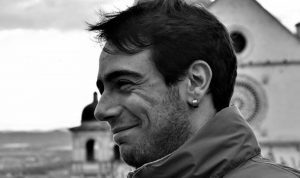Introduction by Ilaria Palomba to Gabriele Galloni’s posthumously published poetry collection Bestiario dei giorni
On the model of medieval bestiaries, Gabriele Galloni creates a world of fantastical animals which reflect some human vices, as if in a distorted mirror.
In its unending forward motion, the whole world will forget us. But on the other hand, the ostrich, for example, prefers to go in circles.
With his attention to metrics and rhyme, something that sets him apart from his contemporaries (writing ‘set’ in the past still seems unreal to me) and his skill in blending traditional forms with freshness and emotional impalpability, he describes a different dimension, that of the allegorical, the oneiric and the symbolic.
The carcasses of its fellow hogs
Devours the pig. Then in embalming fluids
Doth he bathe; being as always the teacher’s pet.
A psychological commentary would be superfluous and misleading, as much as would a close critical reading of the text. This collection instead should be gulped down like a goblet of absinthe, and it will transport us to the kingdom of becoming-animal, as Deleuze would say. Gabriele Galloni’s poetry is the space where they all meet
«You shall have no other God but me»,
the cat meows. It is red with white patches –
shaking very hard for no reason.
I keep coming back to the link between the premature death (at twenty-five) of this young Poet friend of mine – a close friend, a boy who looked like a child but turned into an adult when writing, as though he came from another era – and the gift it has left us. A gift of himself, a poetic maturity that was paid dearly.
Many have wondered what he would have written at thirty or at seventy, sometimes I wonder that too, but the only answer that I can give myself is that he had already lived those years.
With this ironic and visionary collection, he gives us readers a palingenesis of rhythm, synthesis and intuition that does not belong to a youth of twenty-five and perhaps not even to a man of our times. What I liked so much about him was his alternating between the voice of an ultra-modern boy and that of a poet as ancient as the sea. Water is his element and fluidity his instrument: from the sea to the world of the dead and then up to the animal world, with him we cross many planes of immanence, many eras.
Ilaria Palomba
Il riccio
Tra gli aculei del riccio c’è la piana
di Giosafat, la valle del Giudizio;
di vivi meta e di spiriti tana.
The Hedgehog
Among the hedgehog’s quills lies Jehoshaphat’s
plain, the Valley of Judgment;
destination of the living and of spirits the den.
La pecora
Beve la pecora allo stesso fiume
di Eraclito; ma non è sazia mai,
ché l’acqua è troppo capriccioso nume.
The Sheep
The sheep drinks at Heraclitus’ river
All the same; but its thirst is never quenched
Too capricious a god is water.
Il maiale
Il maiale divora le carcasse
dei suoi simili. Si fa il bagno nei liquidi
mortuari; è sempre il primo della classe.
The Pig
The carcasses of its fellow hogs
Devours the pig. Then in embalming fluids
Doth it bathe; being as always the teacher’s pet.
Il leone
Ama le stanze vuote, il re leone.
Così può fare il sovrano tra i mobili,
senza disturbo e senza soluzione.
The Lion
Loves empty rooms, the lion king.
Thus sovereign it can be among the furniture,
With neigh a disturbance nor solution.
La tigre
La tigre si riflette negli specchi
dei suoi padroni. Dea della tribù,
divora giornalmente santi e vecchi.
The Tiger
In her master’s mirror
Is a tiger reflected. Goddess of her tribe,
Saints and old men are her daily fare.
La tartaruga
È facile, se sei una tartaruga,
misurare con precisione il tempo –
il secondo di un pianto o di una ruga.
The Turtle
It’s easy, if you’re a turtle,
To accurately measure time
The second for a cry or that of a wrinkle.
La chiocciola
Cosa trascorre dentro la sua casa?
In che modo la chiocciola si smarrisce,
piange, ritrova o fa tabula rasa?
The Snail
What inside her house is spent?
How does a snail go astray,
How does she cry, find herself or a clean slate make?
Il pellicano
Sarà l’Apocalisse un pellicano
grandioso; bruceremo tutti nella
sua bocca spaventosa, piano piano.
The Pelican
A great pelican shall the apocalypse
Be; we will all burn
In its scary mouth, by and by.
Il camaleonte
Somiglia sempre a quello che non è.
A volte è un albero, a volte un’altra bestia –
di notte capita che sembri me.
The Chameleon
It always resembles what it not be.
Sometimes it’s a tree, sometimes another beast –
At night it happens that it may look like me.
Il rospo
Il rospo vuole in sé l’aria del cielo
tutta. Tutta la vuole fino a scoppiare;
si gonfia. Non esplodere per un pelo.
The Toad
All the air in the sky doth the toad want
For itself. It wants it all ‘til it bursts;
it swells. If it doesn’t explode it’s by a hair.

Gabriele Galloni was born in Rome in 1995 and died prematurely in 2020. He studied modern literature at La Sapienza University. In 2017, he published Slittamenti (Slips, Augh Edizioni, Viterbo) with critical commentary by Antonio Veneziani, In che luce cadranno (“In what light will they fall”) (Rplibri, 2018), L’estate del mondo (The Summer of the World, Saya Editore, 2019) and Bestiario dei giorni (Bestiary of days, Ensemble 2020) was published posthumously.
Cover artwork by Mubeen Kishany





















































